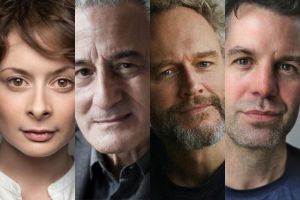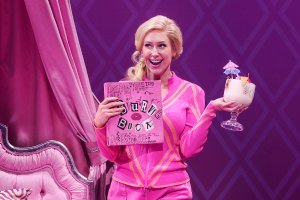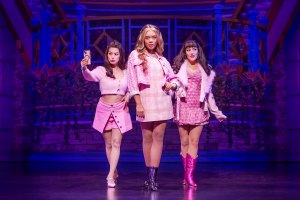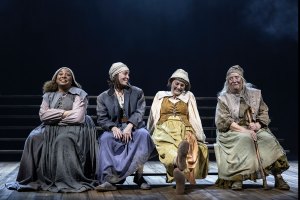Rufus Hound on showing off, Bryan Cranston and playing a fading sex symbol
The comedian and actor is about to open in Sean Foley’s production of Noël Coward’s ”Present Laughter”
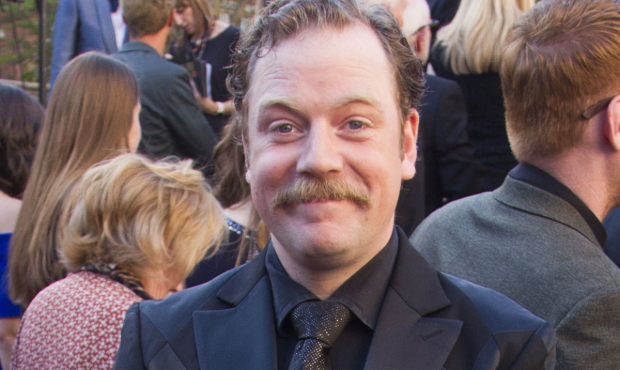
© Dan Wooller for WhatsOnStage
Alongside his work as a stand up comedian, Rufus Hound is best known for his works in musicals including Dirty Rotten Scoundrels and The Wind in the Willows. He now turns his hand to Noël Coward, playing Garry Essendine in Sean Foley's production of Present Laughter at the Chichester Festival Theatre. We caught up with Hound to find out more about the play and his career to date.
1. How would you describe Present Laughter in five words?
Elegant, hilarious, masterpiece, vintage, joy.
2. How would you describe your character, Garry Essendine?
Garry is a fading sex symbol, a famous romantic comedy actor who hasn't really grown up; and his refusal to grow up is arguably about to become his undoing.
3. What do you enjoy the most about starring in this production?
Working with Sean Foley. I didn't know Sean personally before working on this production; I'd auditioned for him some years ago but our opportunity to work together had never really lined up; then he offered this role to me. Doing the play in Chichester, you know you're going to be well supported in delivering a great show – that's their stock in trade. They employ Sean, Sean builds the company – it's just a real pleasure to stand on that stage with those brilliant people. I know that sounds sycophantic but it doesn't stop it being true, Sorry, fans of original thought and insight. But the real joy of doing this is working with people you really rate and respect.
4. Are you a fan of Coward's plays?
I think I've grown up in a period where they've been seen as a bit naff, to be perfectly honest. It's not that I don't like them, I just haven't ever really engaged with them. I like Coward in The Italian Job, though.
5. Why do you think his work still stands up all these years later?
Present Laughter is an unbelievable piece of writing. I've done quite a lot of farce and comedy but this is just another level. I've never seen a play as well constructed for delivering comedy as this. Every character on that stage has a reason to be there, their motivation is super clear. It's incredibly well plotted, the jokes are incredibly good, the characters are very well rounded and all of this has a sensitivity and lightness of touch. There's a bohemian/liberal thinking that's slightly surprising for what we would imagine as post Victorian/early 20th century morality.
6. With Foley known for his comedy directing skills, is this production going to be a total scream?
Yes, is the short answer. What Sean understands is that things done with pace and precision on the whole will be funny, so our whole process has been built around making it swift, deft and detailed. The way he's taught us to do this isn't ponderous or taking the air out of the soufflé. It cracks along.
7. You move between plays and musicals, do you have a preference?
I have no preference between plays and musicals or TV and film. I just like working for people I really respect.
8. What's your earliest memory in entertainment?
Watching Rudolf Nureyev on The Muppet Show, which was an overwhelming influence on my young life. Since I've never truly grown up, you can extrapolate from that it remains so.
9. What would you have done if you hadn't become a performer?
Tricky question. Does that pre-suppose I would be me but not a performer? In which case I'd have felt deeply regretful, sad and embittered that I wasn't able to achieve my destiny! If you're born with a need to be a performer, you'll never not be a performer. You may never earn any money, it might just be something you do in your spare time. It's very hard earning a living showing off but when you realise you don't have a choice, you just have to get on with it. And it's also wholly fulfilling and deeply enjoyable – it's a calling as much as a job.
10. What do you consider to be your big break?
I was working in the interactive galleries at the Science Museum and doing stand up comedy in the evenings; I got wind of the fact there was going to be a new science show for BBC Three called Beauty and the Beast that was meant to be Caprice looking at the beauty industry and somebody referred to as the Beast doing kitchen-sink science experiments showing how all these products worked. So there I was with a blue mohawk in my early 20s living in a shared house in east London; I sent an audition tape, they liked me and though the show never got picked up, Stuart Murphy (who at the time ran BBC Three and subsequently ran most of Sky's entertainment output and is now at ENO) remembered it and got me a job on BBC Three, which lifted my TV profile. But in many ways my best break was standing in for Stephen Grant at the Komedia in Brighton; without that stage time in that club, I think I'd have struggled to do many of the things I've done since. For theatre itself, Steve Marmion then took a punt on me at the Soho Theatre.
11. What is it that draws you to acting?
It was always my first love. I'd never really call the DNA of that into question. By the time you do the school nativity play and people clap, you think oh right, I pretend to be other people and grown-ups and strangers show their appreciation – I need to do more of this. It's hard-wired into me. Once you have the opportunity to earn a living at it, what draws you is being able to work with people who are much better at it than you are. I'm hanging out in the [metaphorical] downstairs corridor with someone like David Threlfall and you realise, oh there's an upstairs and a whole other wing, and manicured grounds and a stable – there's more to it than my schtick.
12. Had you always thought you would be an actor?
Yes, until I was 16 when a sixth form college teacher persuaded everyone in our theatre studies group that being an actor was no way to earn a living and I went to work in an office.
13. How did you overcome that?
I got into stand up because it didn't involve any training, you could just do it yourself. Over eight or nine years I worked out that if a gig went well it was lovely, and if it went badly nobody died and only my own sense of pride was injured. So when people offered me other ways of showing off, I didn't feel the world would end if I failed at them.
14. Who are your idols?
All human beings are flawed, they are all born equal and with the capacity to be the best version of themselves. The lives they lead, their fortunes or misfortunes are what inform their art. So I feel that holding anyone as an idol in some ways devalues how incredible their work is, because to be human and to make work that good is the truly impressive thing. I tend to be more a fan of the work than the person, if that makes sense.
15. If you could go back in time and change one thing, what would it be?
I should never have written that song for Edith Piaf.
16. What have you seen onstage recently that you really enjoyed?
Network at the National was kind of jaw-dropping. You always knew that Bryan Cranston would be great in the lead role, but how they staged it – the on-stage restaurant, which I thought would be the worst experience in the world, was done elegantly and thoughtfully. Seeing it was a reminder that in the arts, if someone tells you it won't work or can't be done, what they really mean is no-one has yet found a way of making this idea work – rather than the accepted wisdom that there are no circumstances under which that idea can work.
17. Do you have any dream roles?
I would like to do more Shakespeare – there's a sort of inevitability in the kind of Shakespearean roles I'm likely to end up playing but that doesn't mean I don't want to play them. A Bottom at some stage and when I'm older, a certain fat knight.
18. What do you do to unwind in your spare time?
Video games, reading, watching science fiction on Netflix. But I have children so spare time is something of an anathema.
19. What have you watched off-stage recently that you've really enjoyed?
An American TV show called Adam Ruins Everything about a precocious millennial who basically inserts himself into the lives of decent normal people and explains why everything they like is wrong. One part QI, one part 30 Rock. The jokes are good, it's made really well, the facts are always interesting and the approach it offers you is one worth taking stock of. One episode opens with a four minute monologue asking you to get your head round the fact you're going to die. Hard to open a comedy show with this long serious monologue but it was genuinely one of the smartest 21 minutes of US network television I've ever seen. The moral philosophy of death. I recommend that.
20. What advice would you give to aspiring actors?
I've heard people say in answer to this question: if there's anything else you can do, do that instead! Being an actor is rather like a machine to make you as insecure as any human being can possibly be. But as I said earlier, it's a calling not a choice. So – it's really really hard work. Brace yourself.















